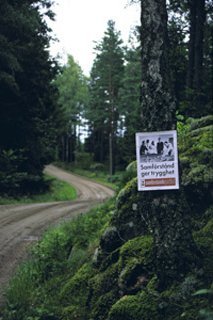Whatever happened to social democracy?
dal 27/1/2005 al 10/4/2005
Segnalato da
Rooseum Center for Contemporary Art
Lars Arrhenius
AUPG
Stuart Brisley
Mike Bode & Staffan Schmidt
Pavel Buchler
Sophie Calle
Esra Ersen
Per Hasselberg
Maria Hedlund
Laura Horelli
Frida Hultcrantz
Ilona Huss Walin
Lyn Lowenstein
Jorgen Michaelsen
Aernout Mik
Museum in Progress
Olof Olsson
Katya Sander
Mladen Stilinovic
Amikam Toren
27/1/2005
Whatever happened to social democracy?
Rooseum, Malmo
Group show. The title alludes to a changing society in which core values are loosened and replaced with new understandings and ideas. The exhibition will especially focus on 20th century social democratic thinking in its many versions and the important influence it has had on culture and society in Sweden, and many other European countries, in the formation of national identity and the development of the welfare society.

Group show
Lars Arrhenius (SE), AUPG (SE), Stuart Brisley (UK), Mike Bode & Staffan Schmidt (SE), Pavel Buchler (UK), Sophie Calle (F), Esra Ersen (TR), Per Hasselberg (SE), Maria Hedlund (SE), Laura Horelli (FI), Frida Hultcrantz (E), Ilona Huss Walin (SE), Lyn Lowenstein (UK), Jorgen Michaelsen (DK), Aernout Mik (NL), Museum in Progress (AU), Olof Olsson (SE), Katya Sander (DK), Mladen Stilinovic (HR), Amikam Toren (IL)
Whatever happened to social democracy? is the title of this spring's large-scale group exhibition at Rooseum. The exhibition includes photographs, installations and video-based works, which present differing points of departure and reflections upon today's society and cultural, social and political reality.
The title of the exhibition alludes to a changing society in which core values are loosened and replaced with new understandings and ideas. The exhibition will especially focus on 20th century social democratic thinking in its many versions and the important influence it has had on culture and society in Sweden, and many other European countries, in the formation of national identity and the development of the welfare society. Economic globalisation, new forms of migration and free market policy have, however, expanded contemporary cultural and political terrain and tested our common values. These new conditions have resulted in the fact that we must relate to new problems and challenges including intolerance and cultural difference in increasingly heterogeneous societies.
Whatever happened to social democracy? will focus on how alternative perspectives on a changing cultural and political environment can be communicated through art. The works will not give direct answers to the rhetorical title. Instead, around twenty works of art will reflect upon and open discussion on areas including historic social democratic projects, socialism and capitalism, ambition and defeat. Several of the works have been developed in connection with the exhibition and three works have been produced within the framework of Rooseum's art program In 2052 Malmo will no longer be 'Swedish'. These artists have, during residencies in Malmo, developed new projects that deal with multiculturalism and our understandings of migration and cultural difference. The projects will be presented both at Rooseum and in different places in Malmo.
In addition, a program consisting of TV series, documentaries and feature films from the 1960s and 70s will be shown. The program will take us back to the "record years" when many promises were issued, a time when people in general were critical towards the prevailing order and a series of reforms of emancipation were carried out. A related series of public talks will also take place throughout the exhibition period with their jumping off point being some of the exhibition's many underlying subjects.
The exhibition is curated by Rooseum in collaboration with Charles Esche and Pavel Buchler. The film program is organised by Anders Kreuger.
Whatever happened to social democracy?, is supported by The Foundation Culture of the Future, and Nordic Culture Fund. In 2052 Malmo will no longer be 'Swedish is a collaboration between Rooseum and NIFCA, Nordic Institute for Contemporary Art. The program is supported by The Foundation Culture of the Future, Nordic Culture Fund and British Council.
Rooseum is supported by Malmo Kulturnamnd, the Ministry of Culture and Kultur Skane.
Image: Olof Olsson and Christer Engstrom: Samforstandspartiet (The Swedish Consensus Party), 1995 - Photo: Christer Engstrom
Press preview: Friday 28 January at 12noon
Saturday the 29th open 12-9; Artists' talk at 6-7pm, Opening at 7-9pm
Rooseum Center for Contemporary Art - Gasverksgatan 22 - Malmo



